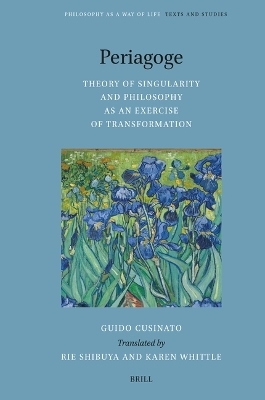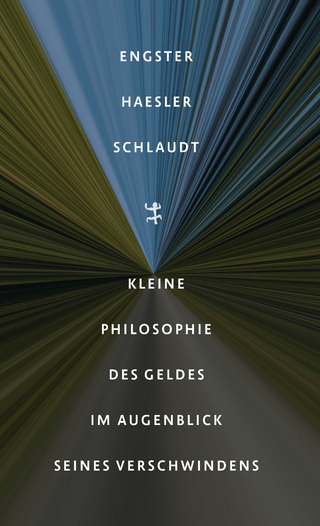
Periagoge - Theory of Singularity and Philosophy as an Exercise of Transformation
Brill (Verlag)
978-90-04-51563-5 (ISBN)
This book returns to the question at the center of our existence, a question that the narcissistic culture in which we are immersed systematically tends to remove: “Why?” The underlying thesis is that the answer must not be sought in success or social recognition, but in a “fragment of truth”, hidden somewhere inside each of us, which reveals itself only if we detach ourselves from our ego and its certainties. It is not, therefore, a matter of finding yet another philosophical theory of the meaning of existence, but rather of shedding light on the conditions under which such meaning can emerge. The author shows us that the ultimate source of our existential orientation lies in the affective sphere, and that the current crisis of orientation is derived from the atrophy of the process of affective maturation on a large scale, and from a lack of knowledge and experience about which techniques are best to reactivate it. We are like glowworms that had once unlearned how to illuminate and have since begun to hover around the magic lantern of the ascetic ideal, already criticized by Nietzsche, and then around neon advertising signs. We are glowworms that have forgotten that we have within our own affective structure a precious source of orientation. The basic thesis is that this source of orientation can be reactivated through the care of desire and practices of emotional sharing.
Guido Cusinato is Full Professor of Philosophy at the University of Verona. He conceives of philosophy as an exercise of transformation and has developed an original theory of “personal singularity” based on the concepts of “order of feeling” and “emotional sharing”. Among his most important publications are Katharsis (Napoli 1999); Person und Selbsttranszendenz. Ekstase und Epoché des Ego als Individuationsprozesse bei Schelling und Scheler (Würburg 2014); and Biosemiotica e psicopatologia dell’ordo amoris (Milano 2018).
Preface to the English Edition
List of Figures
Introduction
1 Experience of the Auroral Void and the Periagoge
2 Glossary
3 Ontology of Singularity and Practices of Emotional Sharing
4 Philosophy as an Exercise of Transformation
1 Hunger to Be Born and Anthropogenesis
1.1 The Heart’s Restlessness and the Hunger to Be Born
1.2 Anthropogenesis and Epigenetics
1.3 The Myth of Personal Identity: “Who Are You?”
1.4 The Singularity: Self-Transcendence and Incompleteness
1.5 Personal Non-Self as a Non-Autopoietic System
2 Periagoge and Exemplarity
2.1 The Periagoge of the Prisoner of the Cave
2.2 Desertification of the Real and Emotional Re-Enchantment
2.3 Exemplum and Auroral Exemplarity
2.4 Exemplarity and Model
2.5 The Main Figures in Which Exemplarity Can Be Exercised
2.6 Excursus: Linda Zagzebski’s Exemplarist Virtue Theory
3 Towards a New Order of Feeling
3.1 Primordial Feeling and the “Principle of Expressivity”
3.2 Expressive Enactivism
3.3 The Main Apparatuses of Expressive Enactivism
3.4 Beyond Bauman’s Liquid Society
3.5 Infatuations and the Deceptions of Feeling
3.6 For a Revaluation of the Concept of Feeling
3.7 Experience as the Result of the Non-Neutrality of Feeling
4 Emotions That Give Form to Existence 168
4.1 Toward Rethinking the Concept of Emotion 168
4.2 What Use Are Emotions? 175
4.3 The Order of the Heart and the Unexplored Enactivism of the Third Level
4.4 The Metabolization of the Emotions
4.5 The Pathic. Being Touched by the World
4.6 Personal Emotion as an Anthropogenetic Laboratory
5 The Care of Desire
5.1 Exercises of De-Constellation: from Destiny to Destination
5.2 The Seedling of Desire
5.3 Care of Desire and Relations of Care
6 Philosophy as Exercise of Transformation
6.1 What Is a Philosophical Exercise of Transformation?
6.2 Exercises of the Will and Exercises of Feeling in Philosophical Practices of Transformation
6.3 Philosophical Exercises of Transformation
6.4 Katharsis. Rethinking the “Learning to Die” in the Sense of Ars Vivendi
6.5 The Black Sun of Egotism. Learning to Separate Oneself from One’s Own Mortiferous Part
6.6 Dis-Tension of the Singularity: Overcoming the Perspective of the Little Self
6.7 The Three Wonders of Plato
6.8 Being Touched by the World. The Thauma between Horror and Wonder
6.9 Annunciations. Exercises for Being Born Along with the World
6.10 Some Considerations on Exercises of Transformation on the Reflective Level
7 Generative Goods and Open Community: the New Axis of Social Transformation
7.1 The Failure of Social Transformation in the Era of Narcissism and the Concept of Happiness
7.2 The Reorientation of Emotions in the Public Sphere
7.3 What Does an Open Community Share?
7.4 Generative Sharing as Material Motivation for Social Transformation
Bibliographical Abbreviations
References
Index
| Erscheinungsdatum | 11.11.2023 |
|---|---|
| Reihe/Serie | Philosophy as a Way of Life ; 4 |
| Übersetzer | Rie Shibuya, Karen Whittle |
| Verlagsort | Leiden |
| Sprache | englisch |
| Maße | 155 x 235 mm |
| Gewicht | 762 g |
| Themenwelt | Geisteswissenschaften ► Philosophie ► Metaphysik / Ontologie |
| Sozialwissenschaften | |
| ISBN-10 | 90-04-51563-1 / 9004515631 |
| ISBN-13 | 978-90-04-51563-5 / 9789004515635 |
| Zustand | Neuware |
| Haben Sie eine Frage zum Produkt? |
aus dem Bereich


